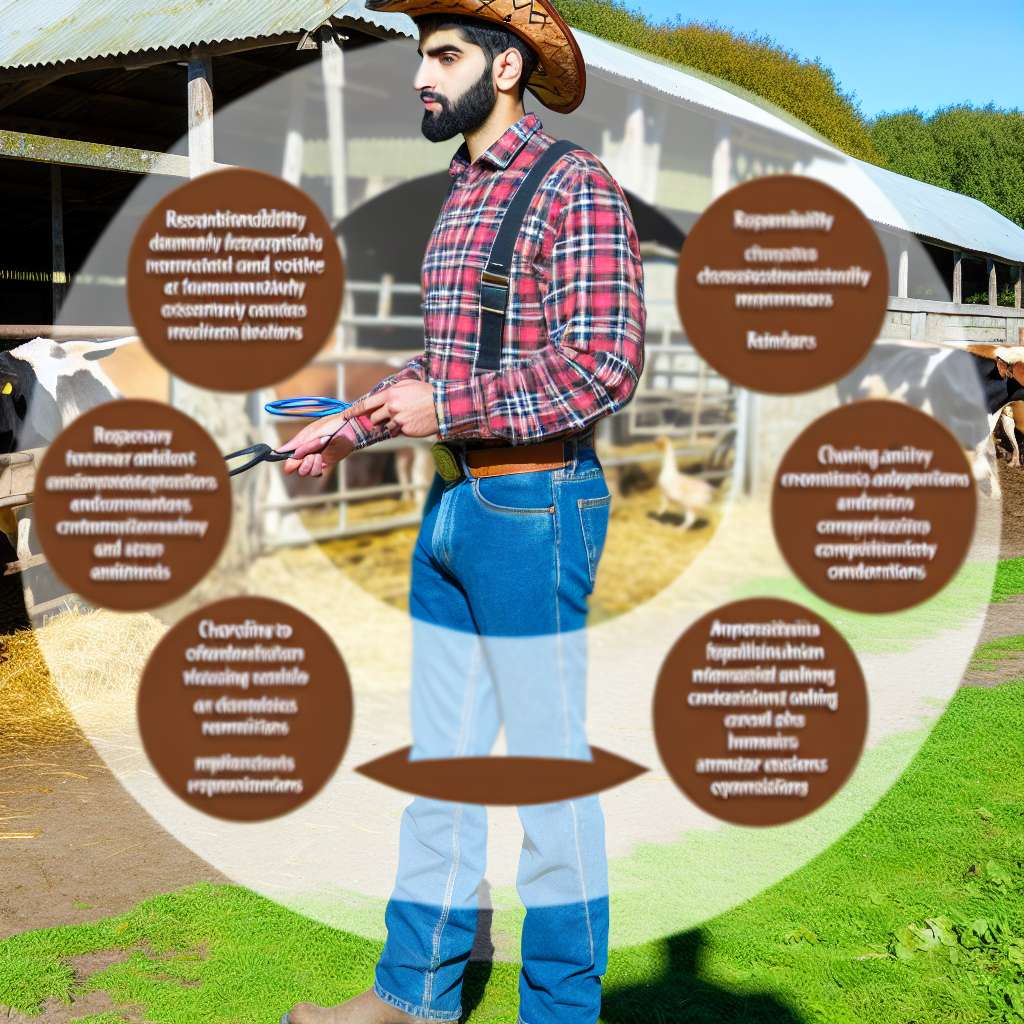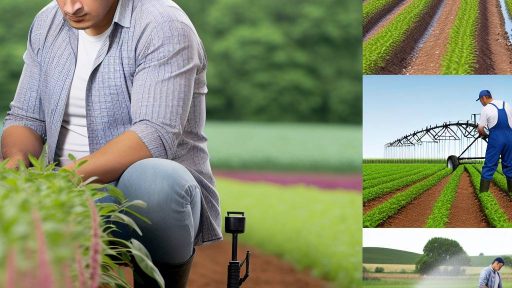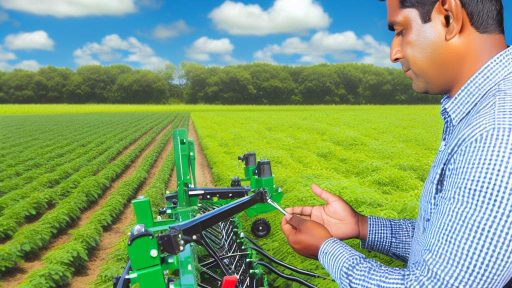Introduction to Animal Welfare
Animal welfare is increasingly recognized as vital in modern farming practices.
This concept emphasizes the ethical treatment of livestock.
Understanding animal welfare regulations helps farmers enhance their operations.
Additionally, it fosters positive consumer perceptions of agricultural products.
Importance of Animal Welfare
Healthy animals contribute to more productive farming operations.
Proper care improves animal health and reduces disease outbreaks.
This directly impacts the quality and safety of food products.
Moreover, good welfare practices can enhance market access.
Implications for Farmers
Meeting animal welfare standards requires significant investment from farmers.
Compliance with regulations can lead to higher operational costs.
However, it can also open doors to premium markets.
Farmers need to balance cost and compliance effectively.
Benefits of Adhering to Welfare Regulations
Adhering to animal welfare regulations offers numerous benefits for farmers.
First, it enhances the overall health of the livestock.
Consequently, healthier animals yield better production outcomes.
Transform Your Agribusiness
Unlock your farm's potential with expert advice tailored to your needs. Get actionable steps that drive real results.
Get StartedSecond, welfare compliance can lead to reduced veterinary costs.
Third, it fosters trust with consumers who value ethical farming practices.
Improved Productivity
When animals are treated humanely, their productivity increases.
Well-cared-for livestock tends to produce more meat, milk, or eggs.
This can translate into increased profitability for farm operations.
Market Advantages
Products from farms that prioritize animal welfare often obtain premium prices.
Many consumers are willing to pay more for ethically produced goods.
Additionally, retailers frequently seek suppliers with high welfare standards.
Understanding Key Regulations
Various regulations govern animal welfare in agricultural practices.
Farmers must be aware of local, national, and international standards.
These regulations often address housing, nutrition, and health care.
National Standards
Many countries have laws that specifically address animal welfare.
Compliance with these laws is mandatory for all farmers.
Farmers should regularly review the policies to ensure adherence.
International Guidelines
Several international organizations provide guidelines for animal welfare.
These standards help unify best practices across borders.
Farmers engaged in export should familiarize themselves with these guidelines.
Overview of Animal Welfare Regulations
Understanding Local Regulations
Local regulations often set the foundation for animal welfare standards.
Many municipalities create rules that align with community values.
For instance, local farms must adhere to zoning laws related to animal husbandry.
Additionally, county ordinances may dictate specific care conditions.
Farmers should frequently check for updates to these regulations.
Exploring National Regulations
National regulations provide a broader framework for animal welfare.
In the United States, the Animal Welfare Act is a primary piece of legislation.
Showcase Your Farming Business
Publish your professional farming services profile on our blog for a one-time fee of $200 and reach a dedicated audience of farmers and agribusiness owners.
Publish Your ProfileThis act governs the treatment of animals in research, exhibition, and transport.
It includes minimum standards for housing and care.
However, it does not cover all farm animals under its provisions.
As a result, farmers must be aware of additional guidelines set by authoritative bodies.
Examining International Standards
International standards aim to unify animal welfare practices globally.
The World Organisation for Animal Health (OIE) plays a crucial role in this area.
OIE guidelines promote responsible management of animals across borders.
Moreover, various countries adopt different models based on OIE recommendations.
Farmers engaging in international trade must understand these standards.
Development of Compliance Programs
Compliance programs help farmers meet regulatory requirements effectively.
These programs include training, monitoring, and protocol development.
Moreover, they streamline adherence to local, national, and international standards.
Engaging staff in compliance training fosters a culture of responsibility.
Regular audits can identify areas for improvement in animal care.
Key Animal Welfare Principles
The Five Freedoms Explained
The Five Freedoms form the foundation of animal welfare guidelines.
These principles promote the physical and mental well-being of all farm animals.
Freedom from Hunger and Thirst
Animals must have access to fresh water and a suitable diet.
This ensures they remain healthy and active.
Regular feeding schedules play a vital role in their welfare.
Farmers should provide nutritious food tailored to the needs of each species.
Freedom from Discomfort
Animals require a safe and comfortable living environment.
Shelter must protect them from harsh weather conditions.
Proper bedding helps improve their overall comfort and health.
Farmers must regularly assess housing conditions to ensure comfort.
Freedom from Pain, Injury, or Disease
Preventing and treating illness is crucial for animal welfare.
Farmers should implement regular health checks and vaccinations.
Access to veterinary care supports the well-being of animals.
This practice minimizes suffering and promotes healthier lives.
Freedom to Express Normal Behavior
Animals should have opportunities for natural behaviors.
Enrichment activities enhance their quality of life.
Space for movement and social interactions is essential.
Farmers can provide materials for play and exploration.
Freedom from Fear and Distress
A safe and secure environment helps reduce fear and stress.
Gentle handling practices promote trust and comfort.
Facilities should minimize stress during transportation and handling.
Creating calm environments supports overall animal welfare.
See Related Content: Integrating Conservation Programs Into Farm Management
Best Practices for Complying with Animal Welfare Regulations in Farming
Understanding Animal Welfare Standards
Farmers must familiarize themselves with animal welfare standards.
These regulations ensure animals are treated humanely.
Moreover, awareness of guidelines helps avoid legal issues.
Showcase Your Farming Business
Publish your professional farming services profile on our blog for a one-time fee of $200 and reach a dedicated audience of farmers and agribusiness owners.
Publish Your ProfileProviding Adequate Space and Shelter
Animals need sufficient space to move freely.
Crowded living conditions can lead to stress and injury.
In addition, provide proper shelter to protect from extreme weather.
Ensuring Proper Nutrition and Water Access
Animals require a balanced diet for health and productivity.
Access to fresh, clean water is essential at all times.
Regularly assess feeding practices to meet nutritional needs.
Practicing Regular Health Checks
Monitor signs of illness or distress promptly.
Engage veterinarians to manage health and vaccination schedules.
Training and Employee Education
Train staff on best practices for animal handling.
Education fosters a culture of compliance and respect.
Involve employees in discussions about animal welfare policies.
Documenting Compliance Efforts
Maintain accurate records of animal welfare practices.
Documenting procedures helps demonstrate compliance during inspections.
Regularly review records to identify areas for improvement.
Engaging with Animal Welfare Organizations
Collaborate with organizations dedicated to animal welfare.
These partnerships can provide valuable resources and insights.
Moreover, they offer opportunities for advocacy and improvement.
Conducting Regular Self-Assessment
Establish a routine for self-assessing animal welfare practices.
Identify gaps in compliance and implement corrective measures.
This proactive approach enhances overall animal care.
You Might Also Like: Implementing Buffer Zones For Chemical Applications
Common Animal Welfare Issues in Agriculture
Lack of Proper Housing Conditions
Improper housing can lead to stress and injury in livestock.
Many farmers still use low-quality facilities.
For instance, confined spaces can prevent natural behaviors.
This confinement can result in aggressive behavior among animals.
Solutions include upgrading housing to ensure adequate space.
Farmers should consider group housing systems for social animals.
Additionally, incorporating enrichment can improve animal welfare.
Nutritional Deficiencies
Animals require a balanced diet to thrive and grow.
Unfortunately, many farms neglect adequate nutrition.
For example, farmers may feed low-quality feed or inadequate rations.
Such practices can lead to health issues, including obesity or malnutrition.
Farmers can address this by consulting nutritionists for proper diets.
Regular assessments of feed quality are essential.
Using supplements can also fill dietary gaps.
Poor Veterinary Care
Access to veterinary care is crucial for animal welfare.
However, some farms lack adequate veterinary support.
Neglecting health needs can lead to serious disease outbreaks.
For example, low vaccination rates increase disease exposure.
Showcase Your Farming Business
Publish your professional farming services profile on our blog for a one-time fee of $200 and reach a dedicated audience of farmers and agribusiness owners.
Publish Your ProfileImproving access to veterinary services is vital.
Farmers should establish a robust animal health management plan.
This plan should include regular health checks and vaccinations.
Inhumane Handling and Transportation
Handling and transportation significantly impact animal welfare.
Improper handling methods can cause fear and stress.
Many animals endure long transport times without breaks.
This situation can lead to exhaustion and injury.
Farmers must train staff in humane handling techniques.
Additionally, ensuring proper loading and unloading facilities is essential.
Implementing good transportation practices enhances animal welfare.
Disease Prevention and Control
Disease outbreaks pose a major threat to animal welfare.
Effective biosecurity measures can prevent infections.
Farmers must implement regular health screenings and vaccinations.
Moreover, maintaining cleanliness in facilities is crucial.
Farmers should also establish quarantine protocols for sick animals.
This practice limits disease spread within herds.
Case Studies and Solutions
Many farms have successfully enhanced animal welfare.
One example is GreenPastures Farm, which improved housing conditions.
They adopted group housing, allowing social interactions and comfort.
An additional case is HappyHooves Ranch, which focused on nutrition.
The ranch consulted experts for diet formulations to boost health.
These case studies highlight potential solutions for farmers.
Implementing best practices significantly enhances animal welfare.
You Might Also Like: Exploring Rural Development Policies That Benefit Modern Farmers

The Role of Technology in Enhancing Animal Welfare on Farms
Introduction to Technological Advancements
Technology plays a critical role in improving animal welfare on farms.
With advancements, farmers can monitor animals more effectively.
Moreover, technology can facilitate better overall management practices.
Monitoring Systems
Animal monitoring systems provide real-time data on health and behavior.
Farmers can use cameras and sensors to observe animals remotely.
These systems enable early detection of health issues.
Automation in Feeding and Care
Automated feeding systems ensure animals receive proper nutrition.
These systems can adjust feed amounts based on individual needs.
Consequently, they reduce food waste and improve animal health.
Data Analytics for Improved Decision-Making
Data analytics allows farmers to track animal performance over time.
Farmers can analyze trends and make informed decisions.
For example, this can help optimize breeding programs.
Health Research and Genetic Improvement
Research and genetic technologies enhance livestock health and welfare.
Farmers can select for traits that promote resilience and well-being.
This leads to healthier animals and improved productivity.
Virtual and Augmented Reality for Training
Virtual reality can train farmers on animal handling techniques.
Showcase Your Farming Business
Publish your professional farming services profile on our blog for a one-time fee of $200 and reach a dedicated audience of farmers and agribusiness owners.
Publish Your ProfileSuch training improves the familiarity of workers with animal behavior.
As a result, this reduces stress for both workers and animals.
Implications of Farm Technological Innovations
Technology significantly enhances animal welfare on farms.
Farmers must embrace these innovations for better animal care.
Ultimately, this leads to more sustainable and humane farming practices.
Learn More: Impact of Farm-To-Table Regulations on Local Agriculture and Farmers
Navigating Inspections and Compliance Audits
Understanding the Importance of Inspections
Inspections play a critical role in animal welfare management.
They ensure compliance with established regulations.
Regular inspections foster accountability among farmers.
Moreover, they help identify areas for improvement.
Preparing for Inspections
Preparation is essential to successfully navigate inspections.
Start by reviewing relevant animal welfare regulations.
Additionally, ensure all records are up-to-date.
Check that your facilities meet cleanliness standards.
Finally, train staff on proper animal handling techniques.
Common Areas of Focus During Inspections
Inspectors typically assess various aspects of animal care.
Housing conditions are scrutinized for cleanliness and comfort.
Feeding practices must comply with nutritional standards.
Veterinary care records should demonstrate regular health checks.
Behavioral indicators are also evaluated to ensure animal well-being.
Responding to Inspection Findings
Upon receiving inspection results, review the findings carefully.
Address any non-compliance issues immediately.
Implement corrective actions to rectify shortcomings.
Document improvements made to ensure compliance for future inspections.
Importance of Compliance Audits
Compliance audits provide a deeper understanding of animal welfare practices.
They help businesses evaluate adherence to regulations.
These audits can improve operations and animal care standards.
Best Practices for Successful Audits
To excel in audits, establish a compliance checklist.
Regular self-assessments will help identify potential gaps.
Moreover, involve staff in the audit preparation process.
Educate your team about the expectations and standards.
Finally, maintain open communication with auditors during the process.
Resources and Support for Farmers
Veterinary Assistance
Veterinary assistance plays a crucial role in maintaining animal welfare on farms.
Farmers can access a variety of services through local veterinarians.
These services often include routine health checks and vaccination programs.
Additionally, veterinarians provide specialized care in emergencies.
Farmers should build strong relationships with veterinary professionals.
This enhances the well-being of livestock and promotes preventative care.
Welfare Organizations
Numerous welfare organizations offer support to farmers regarding animal care.
These organizations advocate for humane treatment and sustainable practices.
Showcase Your Farming Business
Publish your professional farming services profile on our blog for a one-time fee of $200 and reach a dedicated audience of farmers and agribusiness owners.
Publish Your ProfileFor example, the Animal Welfare Institute provides educational resources to farmers.
Moreover, the Humane Society of the United States offers training programs.
Farmers can also benefit from grants and funding opportunities provided by these groups.
These funds can be vital for improving farm facilities and animal housing.
Community Support and Networking
Joining local farming groups can provide essential support for animal welfare initiatives.
Community networks facilitate knowledge sharing and resource allocation among farmers.
Furthermore, attending workshops and seminars can enhance skills and understanding.
These events often feature experts in animal welfare and sustainable farming.
By engaging with peers, farmers can stay informed about best practices.
Government Programs
Various government programs exist to support animal welfare on farms.
Regions often have funding available for welfare enhancements.
Additionally, government agencies may provide educational materials and workshops.
Farmers can find information through the United States Department of Agriculture (USDA).
It is essential to stay updated on changes in regulations and funding opportunities.
Resources for Training and Education
Ongoing education is vital for successful animal welfare management.
Online platforms offer courses focused on animal care practices.
Local colleges and universities may also provide training programs.
Moreover, industry conferences can be an excellent way to learn from experts.
Farmers should actively pursue educational opportunities to stay informed.
Additional Resources
Documents Relevant to the PHS Policy | OLAW
Animal Welfare Act | National Agricultural Library




